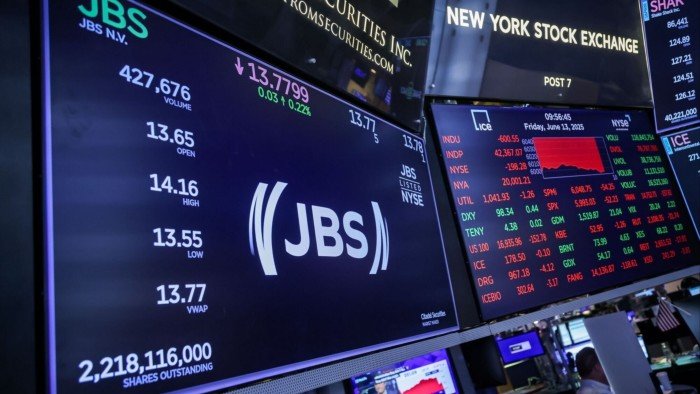This article is an on-site version of our Moral Money newsletter. Premium subscribers can sign up here to get the newsletter delivered three times a week. Standard subscribers can upgrade to Premium here, or explore all FT newsletters.
Visit our Moral Money hub for all the latest ESG news, opinion and analysis from around the FT
Welcome back.
Booming global demand for beef may be bad news for the planet, but it’s been wonderful for shareholders in JBS. The Brazilian company is by far the world’s biggest meat producer, with annual sales that have doubled since 2019 to reach $75bn last year.
That growth has come alongside massive corruption scandals and environmental controversies. Should investors care?
SUSTAINABLE INVESTING
JBS’s rocky path to a long-awaited US listing
In January, a flurry of generous donations by tech companies to Donald Trump’s inauguration fund grabbed headlines. The biggest contribution, though, was not from Silicon Valley, but a $5mn gift from a subsidiary of JBS, the world’s biggest meat company.
One hopes that this donation was motivated purely by public-spiritedness, and had nothing to do with JBS’s lengthy struggle to secure a listing on the New York Stock Exchange. (Similarly altruistic motives, surely, lay behind a $4.9mn donation by cryptocurrency company Ripple Labs, the second-biggest corporate contributor to the fund, and a $2mn gift from online trading platform Robinhood, the fourth-biggest.)
Still, when JBS’s New York listing went live on Friday, some observers may have reflected that things had come together remarkably swiftly for the Brazilian company.
JBS had long wanted a New York listing in order to get access to cheaper funding and a valuation bounce from being included in major stock indices, but had been tied up since 2023 in an extended review process by the Securities and Exchange Commission. The SEC cleared the flotation in April (after dropping an investigation into Robinhood’s crypto business in February, and abandoning litigation against Ripple in March).
JBS has been a target of criticism from environmental groups for allegedly contributing to the destruction of the Amazon rainforest by buying cattle reared on deforested land. As its supermarket clients take fright, JBS has a clear economic incentive to tackle the problem.
When I visited JBS’s operations in São Paulo and Mato Grosso for book research a few years ago, it was keen to show off a high-tech system it was rolling out to identify and avoid cattle that had passed through illegally deforested land (which I highlighted in this video).
Yet the allegations of continued complicity in deforestation have kept coming — culminating in an unsuccessful last-ditch effort by non-profit organisation Mighty Earth to derail the flotation through a legal “notice letter” to the NYSE board that listing JBS’s shares would amount to “facilitating the distribution . . . of the proceeds of crime”.
The obstacles to JBS’s US listing have been more about governance concerns than environmental qualms, however. In January last year, a bipartisan group of 15 US senators — including Marco Rubio, now Trump’s secretary of state — wrote to the SEC expressing “deep concerns” about the flotation.
Among many other objections, the senators noted an extensive corruption scheme undertaken by JBS’s holding company, which paid bribes of $150mn to 1,800 Brazilian officials over more than a decade. That led to penalties of more than $2bn in Brazil and the US, and the imprisonment of brothers Joesley and Wesley Batista, scions of JBS’s founding family. Approval of the listing, the senators wrote, “would subject US investors to risk from a company with a history of blatant, systemic corruption”.
JBS says it has learned lessons and improved its practices. But in its regulatory filings ahead of the listing, the company laid out a long list of environmental, labour and other lawsuits that it is facing, mostly in Brazil and the US. It estimated “probable losses” from these cases at $481mn, and “possible losses” at a further $6.4bn.
Anything close to the latter figure would be ruinously expensive, wiping out most of the $8.5bn in equity on JBS’s balance sheet. Investors didn’t appear worried about that prospect on Friday, pushing the company’s share price up 2 per cent on its first day of trading in the US, giving it a market capitalisation of over $15bn. Wall Street, in short, seems confident that things will work out just fine for JBS’s new chapter in Trump’s America.
Smart reads
Slowdown US green bond issuance is down heavily so far this year.
Rights review TotalEnergies’ $20bn gas development in Mozambique is facing a human rights probe from UK authorities.
Soak the poor A planned US levy on remittances is a regressive tax on the poor, argues the FT editorial board.
Recommended newsletters for you
Full Disclosure — Keeping you up to date with the biggest international legal news, from the courts to law enforcement and the business of law. Sign up here
Energy Source — Essential energy news, analysis and insider intelligence. Sign up here

